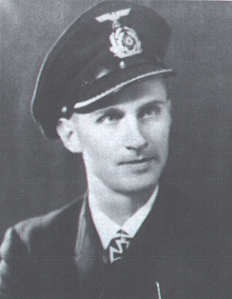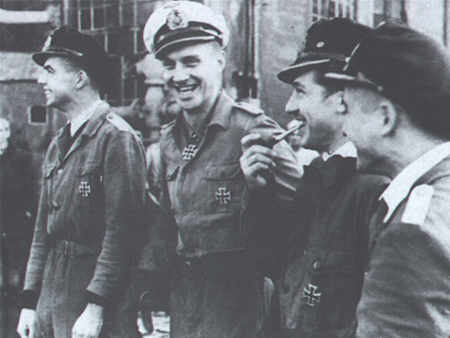Hitler was forced to recognize early on that the Kriesmarine would not be able to match the force of the Allies on the surface. This situation was aggravated further when during the successful invasion of Norway, Germany lost a significant amount of their surface ships. The U-boats, then, were left to carry the weight of the struggle at sea. Initially this concentrated on attacking merchant shipping bound for England, later it was an attempt to break, or weaken, the allied blockade. The tactics used by the U-boat commanders were daring, often staking and infiltrating convoys to attack from within. This required highly trained professionals with nerves of steel, men who could withstand the boredom and confines of the U-boat but be ready for action at any second. They were highly successful in the opening years, but with the development of better tracking and air-attack tactics by the allies their missions became increasingly difficult and dangerous. The following pages will cover the most successful commanders.

|
|
Kapitänleutnant
Freiherr von Schlippenbach |
Freiherr von Schlippenbach was born on April 10th 1914, and began his naval career as a Seekadett in April, 1934. Before the war he served on the line ship Schleswig-Holstein and as a training officer, reaching the rank of Leutnant zur See in 1937.
He joined the U-boat force in 1939 and in the opening years of the war served on U-18, U-3 and U-101 as a watch officer with the rank of Oberleutnant zur See, earning the Iron Cross 2nd Class. On March 1941, he took over his first command on the school boat U-121.
In July 1941 he became the commander of the larger type VIIC U-boat U-453 and in August of that year he was awarded the Iron Cross 1st Class. On November 1st 1941, he was promoted to Kapitanleutnant and during his first patrol with his new U-boat, in December 1941, managed to lead his ship through the heavily patrolled Straits of Gibraltar into the Mediterranean. During the next two years he went on to became one of the most experienced commanders in that theater, with 15 patrols for a total of 328 days at sea. On November 19th 1943, Freiherr von Schlippenbach was presented with the Knights Cross to the Iron Cross for his successes.
In January 1944, von Schlippenbach moved to a staff position in the OKM (Naval High Command) and later on the Marineschule Marwik (Naval Academy). As the man power shortage reached critical levels in the last stages of the war many sailors were used in the defense of the Third Reich. Accordingly, von Schlippenbach spent the last 6 weeks of war on infantry duty in the defense of Central Germany. He surrendered to U.S. forces and spent 3 months as a prisoner of war. On the 20th of April, 1945 he was promoted to Korvettenkapitän.
After the war, von Schlippenbach joined the Bundesmarine in January 1956, where he served mostly in staff positions and retired in September 1972 as a Kapitan zur See. Freiherr von Schlippenbach died on May 11, 1979 in Kiel, Germany.

|
|
Kapitänleutnant Freiherr von Schlippenbach
flanked by Officers of U-453 |
|
|
|---|
| Main Page | Iron Cross | German Cross | War Merit Cross | Wound Badges | War Badges |
| Campaign Awards | Service Awards | Axis Allies | Collectors Corner | Online Forum | Bibliography |